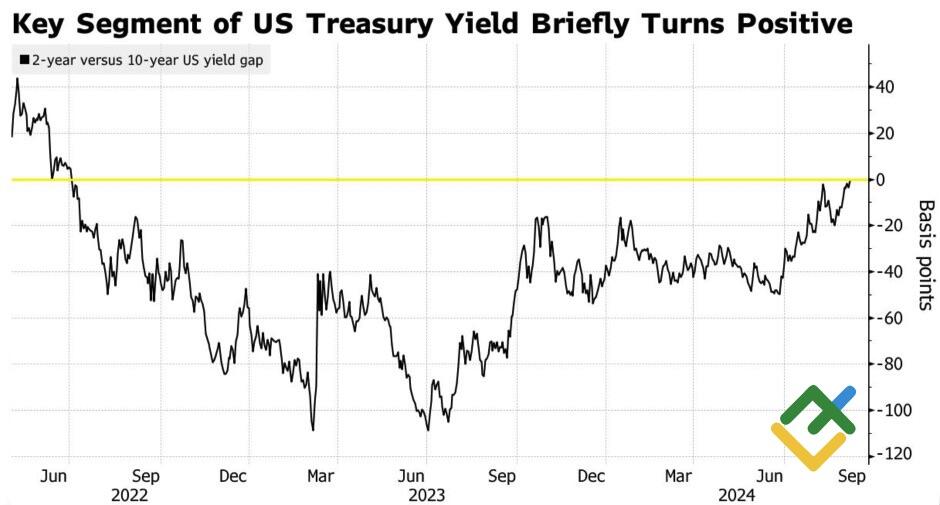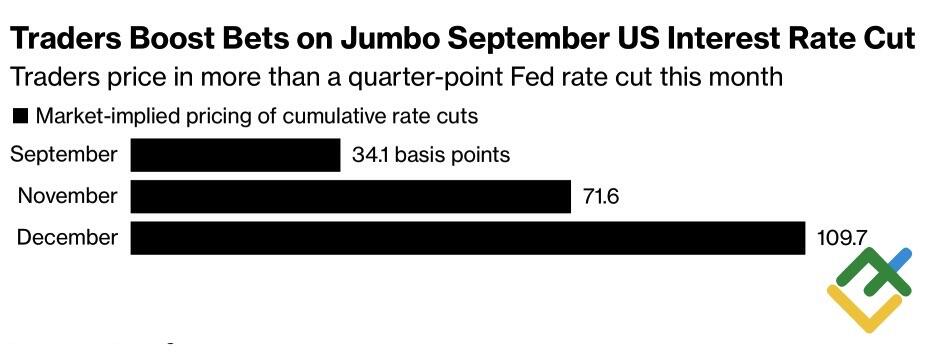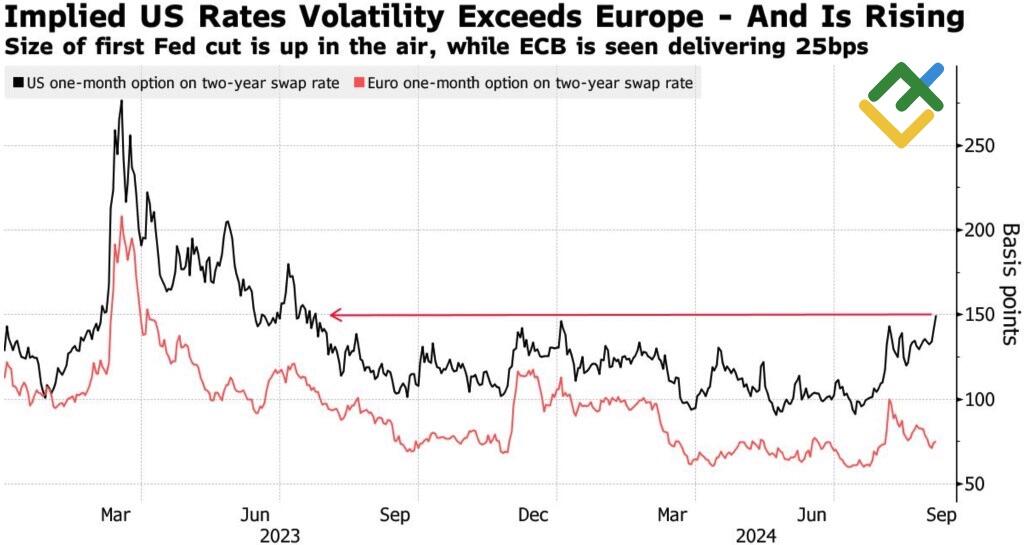
A recent batch of reports on the US economy has prompted renewed speculation about the possibility of an impending recession. Investors are calling on the Fed to take decisive action to cut interest rates. The question remains whether the central bank will proceed with this course of action. Let’s discuss this topic and make a trading plan for the EURUSD pair.
The article covers the following subjects:
Highlights and key points
- Signs of weakness in the US labor market are evident.
- Markets expect a Fed rate cut of almost 110 bps in 2024.
- Risks to price stability and full employment are balanced.
- The EURUSD pair is consolidating in ranges of 1.102-1.109 or 1.104-1.111.
Weekly US dollar fundamental forecast
The storm clouds are darkening over the US. Job openings tumbled to their lowest level since early 2021, layoffs reached a one-and-a-half-year peak, the trade deficit widened, business activity in the manufacturing sector remained below the critical 50 mark for the fifth consecutive month, and the Beige Book indicated signs of stagnation. The market is calling for a bold move from the Fed to stimulate the economy, which has led to a rise in the EURUSD exchange rate.
The yield curve has inverted, indicating that a US recession is in the air again. History shows that this has resulted in a recessionary period in the US.
US Treasury yield curve
Source: Bloomberg.
As anticipated, the derivatives market has increased the projected magnitude of the Fed’s anticipated monetary expansion in 2024 to nearly 110 basis points. The probability of a half-point rate cut in September has risen from 30% to 45% since early fall. The slowing labor market is a significant indicator, according to BMO Global Asset Management, increasing the likelihood of an aggressive start to the Fed’s monetary policy cycle. Notably, if the central bank commences with a 50 bp increase, there is an elevated risk that this will not be the sole broad move.
Market expectations on the Fed’s rate cut magnitude
Source: Bloomberg.
Given the Fed’s stated preference for a data-dependent approach, the market’s growing demand for the central bank to provide support is a logical consequence. However, FOMC officials and experts adopt a calm and measured approach. For instance, Raphael Bostic, President of the Federal Reserve Bank of Atlanta, stated that the current economic situation marks the first time since 2021 that stable prices and maximum employment have reached equilibrium. Meanwhile, the Fed must remain watchful and take all necessary measures to guarantee that these risks continue to decline.
In a poll of experts conducted by Reuters, the majority of respondents believe that the Fed will cut the federal funds rate by 25 basis points at each of the three remaining FOMC meetings in 2024. This is less expansionary than the markets had anticipated. As a result, the EURUSD pair will likely decline to 1.1 by the end of November before rising to 1.11 by the end of February and 1.12 a year later.
Thus, it is unclear what the future stance of the Fed will be. At least, the actions of the ECB are more predictable. Analysts anticipate that the European Central Bank will reduce the deposit rate in September and implement two to three rounds of monetary expansion in 2024. The greater uncertainty in US monetary policy is reflected in the accelerated growth of volatility in the US bond market compared to its European counterpart.
Debt markets volatility
Source: Bloomberg.
Weekly EURUSD trading plan
In theory, this should bolster the US dollar as a safe-haven currency, but it is challenging for traders to make informed decisions without data on the US labor market for August. In light of the forthcoming release of key economic data, the probability of the EURUSD entering a period of consolidation within the 1.102-1.109 or 1.104-1.111 range is rising. In such circumstances, it would be better to either refrain from market engagement or sell the currency pair if it shows an upside movement.
Price chart of EURUSD in real time mode
The content of this article reflects the author’s opinion and does not necessarily reflect the official position of LiteFinance. The material published on this page is provided for informational purposes only and should not be considered as the provision of investment advice for the purposes of Directive 2004/39/EC.
{{value}} ( {{count}} {{title}} )
This post is originally published on LITEFINANCE.






